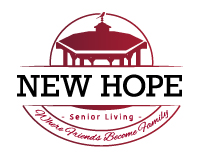Common Terms
At New Hope Senior Living, we believe knowledge is power. When it comes to senior home care in Hendersonville, TN, there are many commonplace terms you may be familiar with. While it may seem like a complicated process, we believe knowing these terms will help ease your mind when researching on your own. We know finding the right home for your loved one can be a difficult task, but with these terms, we aim to make research just a little less hard on you.
This terminology will help you and our staff communicate better on a regular basis so we can help your loved one in an efficient way. Communication is the key to all relationships, and you want to be able to communicate with your family as easily as possible. You will often see these terms mentioned throughout our website, and while some of them are straightforward, we want to ensure you understand what senior living can be like.
For instance, the term “Instrumental activities of daily living” (IADL for short) isn’t a term that you hear in daily conversation, but at New Hope Senior Living, we use it on a regular basis with our staff, seniors, and related families. Our goal with this page is to ensure you know terms such as this one so you can incorporate them into your conversations concerning senior living.
If this section doesn’t cover a term you’re curious about, contact us today and we will help you with any questions you may have about senior home care and assisted living facilities in Hendersonville, TN!
Activities of Daily Living (ADL) – The tasks people perform each day, such as dressing, bathing, grooming, dining, medication management.
Instrumental Activities of Daily Living (IADL) – Are those activities that allow an individual to live independently in a community. Although not necessary for functional living, the ability to perform IADLs can significantly improve the quality of life. The major domains of IADLs include cooking, cleaning, transportation, laundry, and managing finances. IADLs are commonly assessed by occupational therapists in the setting of rehab to determine the level of an individual’s need for assistance and cognitive function.
Caregiver to Resident Ratio – This is the number of caregivers on duty per the number of residents. This is a major factor in the quality of care that will be able to be provided.
Aging in Place – The concept of remaining in one’s home regardless of changes in health or care needs. This can take place in a senior living community or in one’s home.
Alzheimer’s Disease – A progressive, neurodegenerative disease characterized by loss of function and death of nerve cells in several areas of the brain, leading to loss of mental functions such as memory and learning. Alzheimer’s disease is the most common cause of dementia.
Caregiver – 65.7 million caregivers make up 29% of the U.S. adult population providing care to someone who is ill, disabled or aged. The word “caregiver” refers to the primary person in charge of caring for an individual with special needs, usually associated with Alzheimer’s disease. This person is usually a family member or designated healthcare professional.
Health Insurance Portability and Accountability Act (HIPPA) – This act states the requirements that a long term care policy must follow in order that the premiums paid may be deducted as medical expenses and benefits not paid be considered as taxable income.
Home Health Care – Provision of medical and nursing services from licensed providers and professionals in an individual’s own home.
Hospice Care – Philosophy and approach to providing comfort and care at end of life rather than providing heroic lifesaving measures. Hospice care can include medical, counseling and social services. Most hospice care is in-home, while specialized hospices or hospitals also provide these services.
Long Term Care – Care given in the form of medical and support services to someone who has lost some or all of their capacity to function due to an illness or disability.
Long Term Care Ombudsman – A U.S. state-appointed official tasked with ensuring an organization or facility remains accountable to the public who is outside of its typical chain of command.
Long Term Care Insurance – Insurance that pays for a succession of care giving services for the elderly or chronically ill. This care may be provided in a community or in an individual’s home with a nurse or aide.
Occupational Therapy – A creative activity prescribed for its effect in promoting recovery or rehabilitation. This is done to help individuals relearn activities of daily living and is generally administered by a licensed therapist.
Palliative Care – An area of health care that focuses on providing pain relief and preventing chronic suffering for patients. The goal of palliative care is to improve the quality of life in all areas of a patient’s life including physical, emotional, spiritual and social concerns that arise with advanced illness.
Physical Therapy – The treatment of disease or injury, by physical and mechanical means (as massage, regulated exercise, water, light, heat, and electricity.) Physical therapists plan and administer prescribed physical therapy treatment programs for residents to help restore their function and strength.
Rehabilitation – Therapeutic care for persons requiring intensive physical, occupational, or speech therapy.
Still need help? Send us a note!
For any other questions, please use our contact form here. Or give us a call at 615-431-1430
